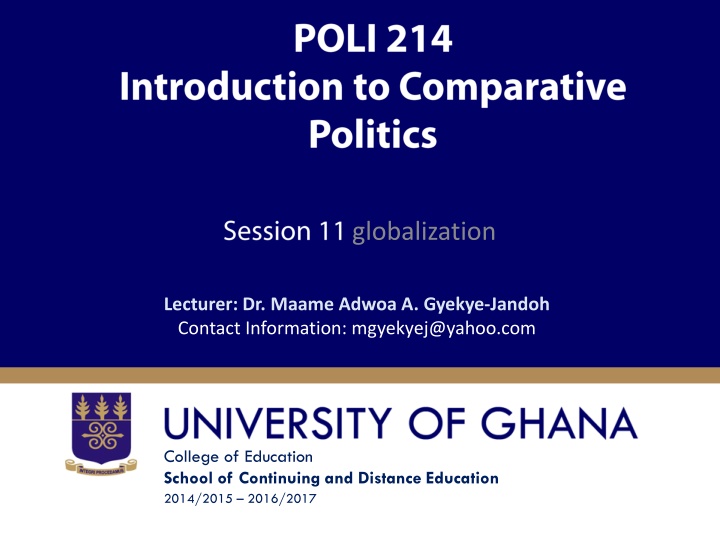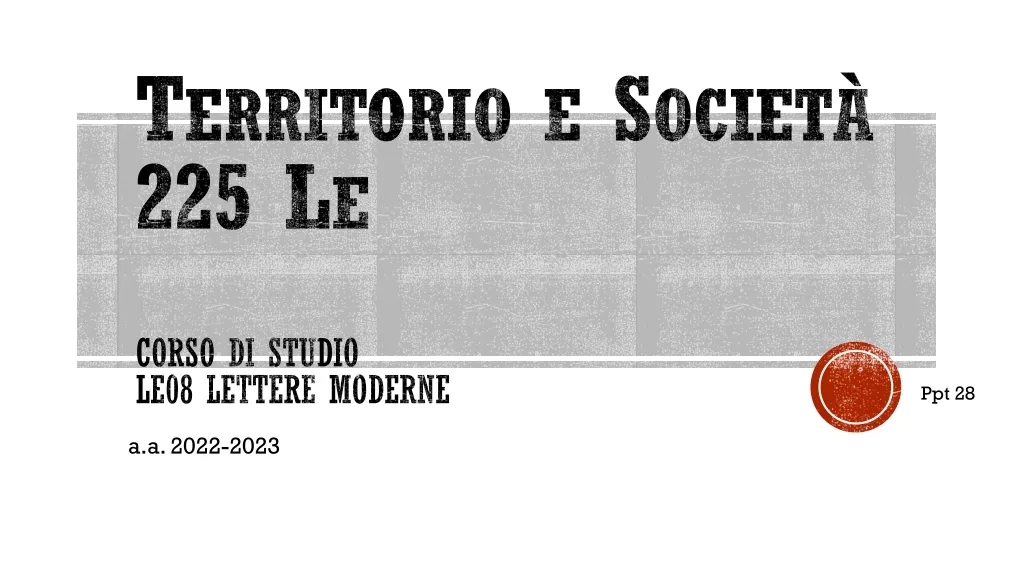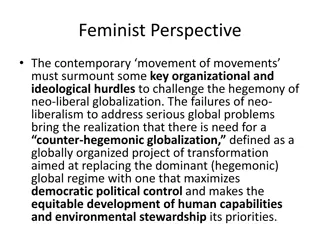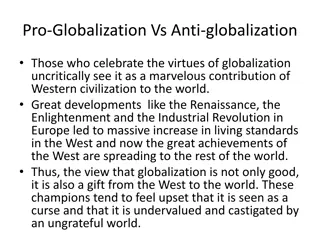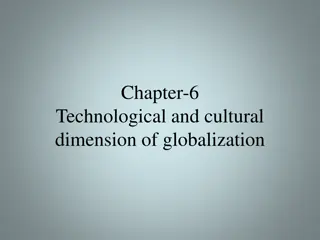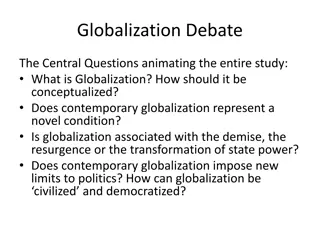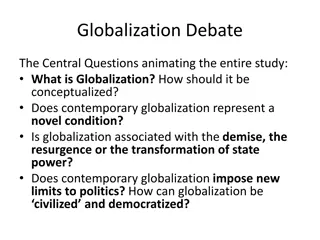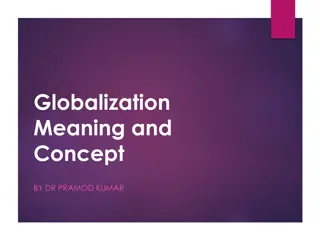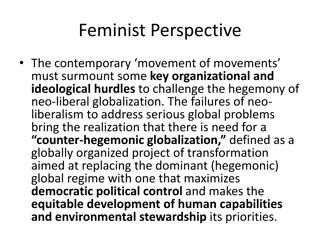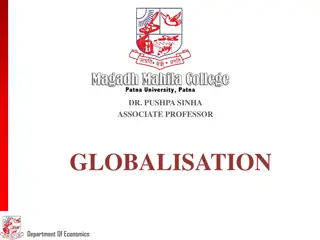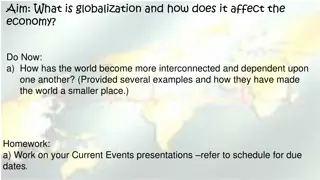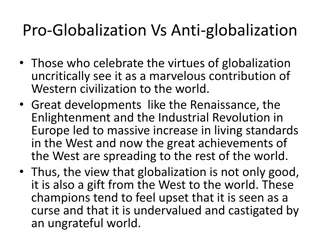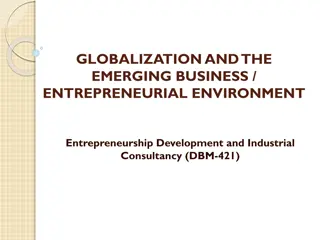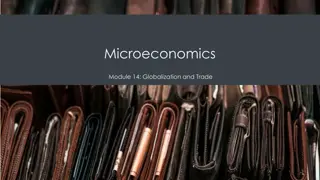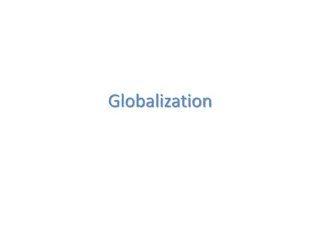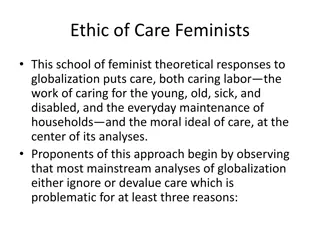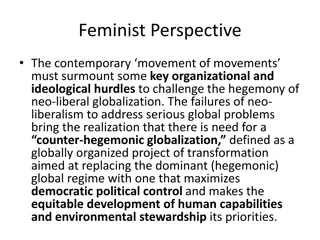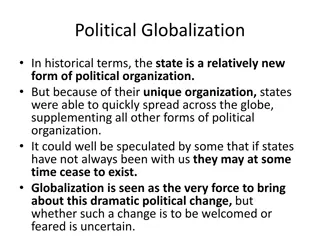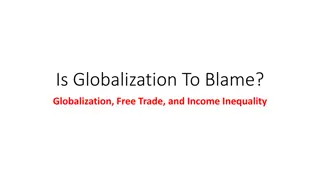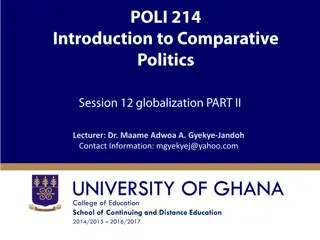globalization
This session explores the concept of globalization, covering definitions, features, forms, and institutional implications. Topics include political globalization, economic interconnection, cultural trade, and more. Join Dr. Maame Adwoa A. Gyekye-Jandoh for an in-depth discussion.
Download Presentation

Please find below an Image/Link to download the presentation.
The content on the website is provided AS IS for your information and personal use only. It may not be sold, licensed, or shared on other websites without obtaining consent from the author.If you encounter any issues during the download, it is possible that the publisher has removed the file from their server.
You are allowed to download the files provided on this website for personal or commercial use, subject to the condition that they are used lawfully. All files are the property of their respective owners.
The content on the website is provided AS IS for your information and personal use only. It may not be sold, licensed, or shared on other websites without obtaining consent from the author.
E N D
Presentation Transcript
globalization Lecturer: Dr. Maame Adwoa A. Gyekye-Jandoh Contact Information: mgyekyej@yahoo.com College of Education School of Continuing and Distance Education 2014/2015 2016/2017
Session Overview This session is devoted to the concept of globalization. We will discuss the various definitions of globalization and explain the features of globalization. Three forms of globalization will be discussed in this session and in session 12. We will also examine institutions and globalization. Slide 2
Session Outline The key topics to be covered in this session are as follows: Topic One: What is Globalization? Topic Two: Institutions and Globalization Topic Three: Political Globalization Slide 3
Reading List O Neil, Patrick H. 2007. Essentials of Comparative Politics. New York and London: W.W. Norton & Company. Harold, Andrew, Tuathail, Gearoid O. and Susan M. Roberts. 1998. An Unruly World? globalization, Governance and Geography. London: Routledge. Keohane, Robert O. and Joseph S. Nye, Jr. 2000. Introduction, in Joseph S. Nye, Jr. and John. D. Donahue, eds. Governance in a Globalising World. Washington: Brookings Institution Press. Held, David. 1995. Democracy and the Global Order. Cambridge: Polity Press. Kaldor, Mary. 2003. Global Civil Society: An Answer to War. Cambridge: Polity. Barber, Benjamin. 1995. Jihad versus McWorld: How Globalism and Tribalism Are Reshaping the World. New York: Random House. Slide 4
Topic One WHAT IS GLOBALIZATION? Slide 5
What is globalization? Globalization Defined: The following definitions will help you understand the true meaning of the concept of globalization: Globalization is a process by which the web of global connections becomes increasingly thick , creating an extensive and intensive web of relationships between many people across vast distances (O Neil, 2007). Globalization is a process which allows the economy, politics, culture, and ideology of one country to penetrate another. In the realm of politics, globalization has led to worldwide preference for democracy. Culturally, globalization has led to the trade of identical goods to distant countries and massive migration of people (Mittelman, 1996). Slide 6
What is globalization (contd.) Economically, globalization is a process which leads to a situation where national economies are closely linked to a world economy. Under globalization, production and finance are being organized in cross- border networks without much regulation (Herald et al, 1998). Globalization represents a change in human organisation and interconnection as a result of technological change. Slide 7
Features of globalization There are six major features of globalization. These features help further clarify the concept: Breakdown of international barriers Increased trade and investment world-wide Increased immigration International spread of pandemic diseases, e.g. HIV- AIDS Global spread of technology Rapid dissemination of news and ideas worldwide Slide 8
In Summary There are various definitions of the term globalization. The definitions are all talking about the increasing level of human interaction and contacts across national boundaries. This process develops certain characteristics including free trade, technological advancement and increased migration. Slide 9
Questions to Consider Give any two definitions of globalization. Discuss briefly any three features of globalization. Are there any disadvantages to globalization? Slide 10
Topic Two INSTITUITONS AND GLOBALIZATION Slide 11
Institutions and globalization This topic examines the various institutions that are major symbols of globalization. We will discuss both corporate and non- governmental institutions. Your knowledge of these institutions will be useful when we discuss political and economic globalization. Multinational Corporations Multinational corporations (MNCs) are firms that produce, distribute, and market their goods or services in more than one country. Examples of MNCs include Microsoft, Sony and Coca-Cola. These corporations are richer than most countries in the world. They are so powerful that they sometimes influence politics, economic development and social relations of countries all over the world. The financial power of MNCs sometimes allow them to interfere in the political process of countries that they operate in. Slide 12
Institutions and globalization (contd.) Non-governmental Organisations (NGOs) NGOs are national and international groups, independent of any state, that pursue policy objectives and foster public participation. NGOs also have power and influence all over the world. They can change how things work in any given country. Examples of NGOs include Greenpeace, Amnesty International, Red Cross etc. The NGO family act locally and think globally. Their operations penetrate borders, making nonsense of geographical boundaries. Slide 13
Institutions and globalization (contd.) Intergovernmental Organisations (IGOs) Inter-governmental organisations (IGOs) are groups that are created by groups of states to serve particular policy ends. They have power and authority over countries that are members of the organisation. Examples of IGOs include the United Nations (UN); the World Trade Organisation (WTO), the European Union (EU) and the African Union (AU). These IGOs have global reach, and they operate internationally, embracing all countries and all citizens in their activities. They represent an important tool for globalization. Slide 14
In Summary The various institutions that have come to characterize a growing trend of global integration and interconnectivity include MNCs, NGOs, and IGOs. These institutions shape and influence the process of globalization. MNCs, for example, are the driving force of economic globalization. IGOs are also significant to the political globalization of the last two decades. Slide 15
Questions to Consider Explain what a multinational corporation is, and give at least one example. Define non-governmental organisations, and briefly explain their significance for globalization. Distinguish between non-governmental organisations and inter-governmental organisations. How are they important tools for globalization? Slide 16
Political globalization Globalization and Sovereignty globalization has had an impact on the sovereignty of the state. States have lost some measure of sovereignty either intentionally or unintentionally. Intentional loss of sovereignty is where, as a result of globalization, states voluntarily join IGOs and forfeit some of their sovereignty as a state. For example, member states of the European Union (EU) have given up some of their sovereignty to enjoy the benefits of EU membership. Slide 18
Globalization and Sovereignty On the other hand, unintentional loss of sovereignty occurs through the advance of technology and erodes the sovereignty of states. The internet, for example, does not respect boundaries; therefore, national property rights are disregarded everyday through transactions done online. The process of globalization and its impact on sovereignty is what Thomas Friedman referred to as a golden straightjacket. Slide 19
globalization and Violence Globalization has created violent international non-state actors that are decentralized and flexible. These groups hold no territory and exercise no sovereignty and are able to draw financial and other support from across the globe. Terrorist groups such as Al-Qaeda are very effective because of globalized technology such as the use of cell phones, internet, and satellite television which allow them to communicate, disseminate propaganda, access money, and recruit new followers. International terrorism has, therefore, become more frequent and more effective as a result of globalization. Slide 20
In Summary Political globalization has increasingly challenged the notion of state sovereignty and independence. The growing influence of IGOs has undermined the power and authority of the state. Moreover, the increasing interconnectivity of the world through globalization has created enabling environment for non-state actors to be more active players in the realm of international politics. Most terrorist organisations operate effectively and successfully because of globalized technology. Slide 21
Questions to Consider Explain how political globalization affects state sovereignty. Distinguish between intentional and unintentional loss of sovereignty. Discuss how globalization has led to more violence from non-state actors. Slide 22
Conclusion of Session 11 In this session, we have examined the concept and features of globalization. We have also discovered that institutions affect globalization, and that in particular, certain institutions, such as IGOs like the EU, affect the sovereignty of member states. globalization has also provided the unwitting context for international terrorism. In the next and final session, we will turn our focus to Economic globalization, Social globalization, and Past and Present globalization. Slide 23
References O Neil, Patrick H. 2007. Essentials of Comparative Politics. New York and London: W.W. Norton & Company. Harold, Andrew, Tuathail, Gearoid O. and Susan M. Roberts. 1998. An Unruly World? globalization, Governance and Geography. London: Routledge. Keohane, Robert O. and Joseph S. Nye, Jr. 2000. Introduction, in Joseph S. Nye, Jr. and John. D. Donahue, eds. Governance in a Globalising World. Washington: Brookings Institution Press. Held, David. 1995. Democracy and the Global Order. Cambridge: Polity Press. Kaldor, Mary. 2003. Global Civil Society: An Answer to War. Cambridge: Polity. Barber, Benjamin. 1995. Jihad versus McWorld: How Globalism and Tribalism Are Reshaping the World. New York: Random House. Slide 24
